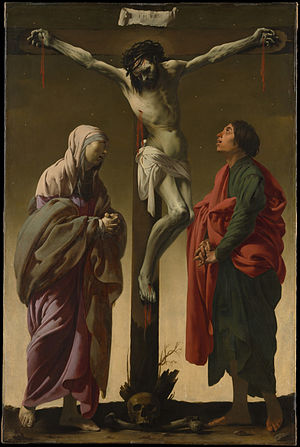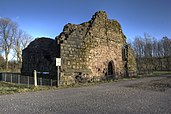From today's featured article
Beavers are large, semiaquatic rodents of the Northern Hemisphere. There are two extant species: the North American (pictured) and Eurasian beaver. Both have stout bodies, large heads, chisel-like incisors, hand-like front feet, webbed back feet and flat, scaly tails. The Eurasian beaver has a longer skull, lighter color and narrower tail. Both are found in freshwater habitats, and are herbivorous, consuming plants and tree bark. They build dams and lodges using tree branches, vegetation, rocks and mud. Their infrastructure has a great impact on the surrounding environment. Adults live in monogamous pairs with their offspring. Beavers are territorial and scent-mark with a secretion called castoreum. Historically, beavers were hunted for their fur, meat and castoreum. Overhunting nearly exterminated both species. With protection, populations have rebounded, and both are listed as least-concern species on the IUCN Red List. The beaver symbolizes industriousness and is Canada's national animal. (Full article...)
Did you know ...
- ... that although Titian's Allegory of Marriage (pictured) left England in the 17th century, two early replicas, probably done from the original, remain in the Royal Collection?
- ... that a revival of the comedy series Lizzie McGuire was ordered in 2019, but canceled mid-production after Disney deemed it not family-friendly enough?
- ... that King Charles III's wife left him after she found four of his lovers living in his palace?
- ... that Sweden won the Eurovision Song Contest 1999, twenty-five years after ABBA brought the country its first victory in the contest?
- ... that Liberian paramount chief Tamba Taylor worked as a tailor and claimed to have sewn clothes for Ethiopian emperor Haile Selassie and Ghanaian president Kwame Nkrumah?
- ... that the LAPD Special Investigation Section trains military special forces in surveillance?
- ... that Gottfried August Homilius wrote Passions for Good Friday services during his time as music director of the Church of the Holy Cross in Dresden?
- ... that Basic Medicine features North Korean propaganda?
In the news

- Finland joins NATO as its 31st member (flags pictured).
- Former president of the United States Donald Trump is arraigned on 34 charges of falsifying business records.
- In the Andorran parliamentary election, the liberal coalition, led by Prime Minister Xavier Espot, wins an absolute majority of seats in the General Council.
- In NCAA Division I basketball, the LSU Tigers win the women's championship and the UConn Huskies win the men's championship.
On this day
April 7: National Beer Day in the United States
- 1655 – After a conclave lasting eighty days, the College of Cardinals elected Fabio Chigi as Pope Alexander VII (pictured).
- 1926 – Italian dictator Benito Mussolini survived an assassination attempt by Irishwoman Violet Gibson.
- 1945 – World War II: U.S. forces sank the Japanese battleship Yamato during Operation Ten-Go in the East China Sea.
- 1979 – Uganda–Tanzania War: Tanzanian forces defeated Ugandan troops and their Libyan allies at the Battle of Entebbe, opening the way for an advance on the Ugandan capital, Kampala.
- 2017 – A hijacker deliberately drove a truck into crowds along Drottninggatan in Stockholm, Sweden, killing five people.
- El Greco (d. 1614)
- Marjory Stoneman Douglas (b. 1890)
- Nuno Mendes (b. 1978)
From today's featured list
There are nine castles in Greater Manchester, a metropolitan county in North West England. They consist of four motte-and-bailey castles, three fortified manor houses, an enclosure castle, and a possible shell keep. Four of Greater Manchester's castles are scheduled monuments: Buckton, Bury, Radcliffe Tower (pictured), and Watch Hill. The purpose of a castle was not simply militaristic, but was also considered to be a stamp of authority over the population of an area and a status symbol. Some would have acted as centres of trade and administration for a manor. The earliest castles in Greater Manchester are Dunham and Watch Hill in Trafford, Ullerwood in Manchester, and Stockport Castle in Stockport. They were first recorded in 1173 as belonging to barons who had rebelled against Henry II. (Full list...)
Today's featured picture

|
The Crucifixion with the Virgin and St John is an oil painting by the Dutch artist Hendrick ter Brugghen, probably painted around 1625 as an altarpiece for a Catholic clandestine church likely located in Utrecht in the Calvinist Dutch United Provinces. The scene is taken from the account of the crucifixion of Jesus in the Gospel of John, and depicts Jesus being mourned by his mother Mary and John the Apostle. At the base of the cross are bones, traditionally identified as those of Adam. The scene is set in an atmosphere of deep dusk with stars visible in the background. The painting was not known until it was discovered in a bombed-out church in South Hackney, London, in 1956. Initially unrecognized, it was identified before an appearance at Sotheby's later that year. It was acquired by the Metropolitan Museum of Art in New York, where it now hangs. Painting credit: Hendrick ter Brugghen
Recently featured:
|
Other areas of Wikipedia
- Community portal – The central hub for editors, with resources, links, tasks, and announcements.
- Village pump – Forum for discussions about Wikipedia itself, including policies and technical issues.
- Site news – Sources of news about Wikipedia and the broader Wikimedia movement.
- Teahouse – Ask basic questions about using or editing Wikipedia.
- Help desk – Ask questions about using or editing Wikipedia.
- Reference desk – Ask research questions about encyclopedic topics.
- Content portals – A unique way to navigate the encyclopedia.
Wikipedia's sister projects
Wikipedia is written by volunteer editors and hosted by the Wikimedia Foundation, a non-profit organization that also hosts a range of other volunteer projects:
-
Commons
Free media repository -
MediaWiki
Wiki software development -
Meta-Wiki
Wikimedia project coordination -
Wikibooks
Free textbooks and manuals -
Wikidata
Free knowledge base -
Wikinews
Free-content news -
Wikiquote
Collection of quotations -
Wikisource
Free-content library -
Wikispecies
Directory of species -
Wikiversity
Free learning tools -
Wikivoyage
Free travel guide -
Wiktionary
Dictionary and thesaurus
Wikipedia languages
This Wikipedia is written in English. Many other Wikipedias are available; some of the largest are listed below.
-
1,000,000+ articles
-
250,000+ articles
-
50,000+ articles



